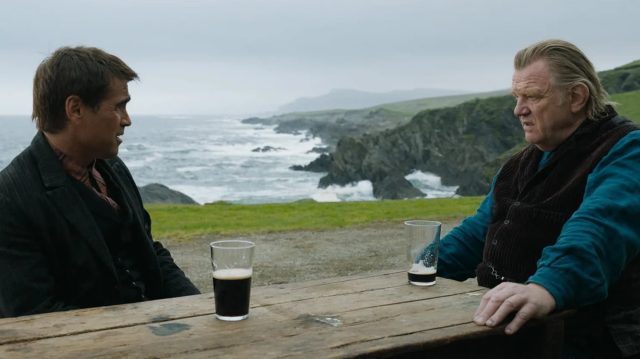
The year is 1923, and civil war wages on Irish soil. The country won independence from British rule the year prior, but conditions of the truce have motivated brothers in arms to take up rifles against one another and shed more blood.
And off the coast of County Galway, another civil war wages on the island of Inisherin, this one between Pádraic (Colin Farrell) and Colm (Brendan Gleeson). The two are old drinking buddies, and every afternoon, Pádraic follows Inisherin’s famine walls down to the sea, where he collects Colm for a pint at the pub.
But one day, Colm doesn’t answer. He’s sitting inside, smoking, but he makes no acknowledgment of Pádraic’s presence. Flummoxed, Pádraic returns home to his sister, Siobhan (Kerry Condon), who wants to know if they’ve been rowing with each other. Pádraic doesn’t think so, but once the rest of the town wonders the same thing, Pádraic starts to think they have been. Well, they haven’t, but they are now.
I won’t reveal the reason for Colm’s cold shoulder, but it is both incredibly petty and perfectly understandable. It’s also not very nice, and Pádraic might be the nicest man in Inisherin — a little dull, sure, but an all-around decent fellow. Not that that’s stopping Colm. Inisherin is a small island with a smaller population, and turning your back on one is easier said than done. You know the phrase “cut off one’s nose to spite to one’s face”? It’s a lot like that.
Written and directed by Irish playwright and filmmaker Martin McDonagh, The Banshees of Inisherin is his first feature set on home turf and his first to feel like a play brought to the screen. Sometimes that phrase is used to slight a film, but not here. The Banshees of Inisherin features the types of modest conflicts and spectacular writing that don’t always make it to the silver screen.
Cinema is a bombastic medium, and McDonagh’s previous works — In Bruges, Seven Psychopaths and Three Billboards Outside Ebbing, Missouri — contain volume fitting of a 40-foot screen. All three are good, but Banshees is better. It’s quieter, more thoughtful and beautifully rendered. The speaking roles are limited to about 10 players, four or so locations and a conflict encompassing everyone without overreaching. The cinematography from Ben Davis is stunning (a shot of Colm sitting in his home smoking and not talking to Pádraic features sunshine filtering through the window in an image befitting a Vermeer), and Carter Burwell’s score, laced simply and touchingly throughout, brings an Old World romance with a touch of melancholy.
Banshees is a mature work, one where McDonagh realizes that a microcosm can say more than an entire war. And that the movie carries as many laughs as it does, not to mention the sheer pleasure of keenly written dialogue, only makes a gorgeous experience all the more enjoyable. In real life, Ireland’s troubles were just beginning, but McDonagh finds a way to bring peace. François Truffaut was right: “Cinema is an improvement on life.”
For more movie reviews, tune into After Image, Fridays at 3 p.m., on KGNU: 88.5 FM and online at kgnu.org.














